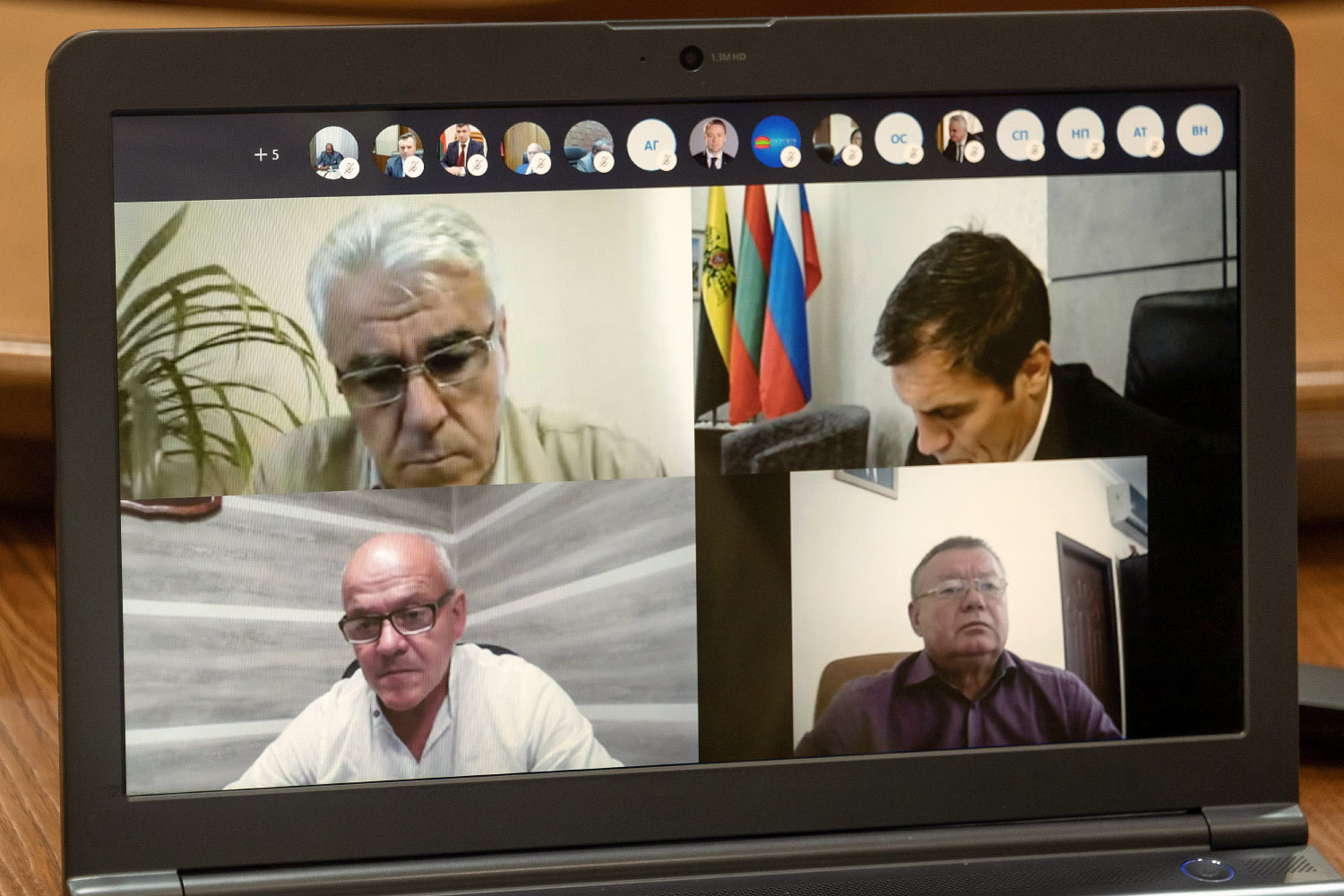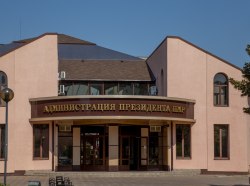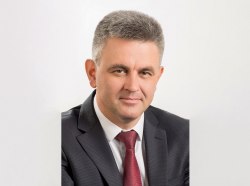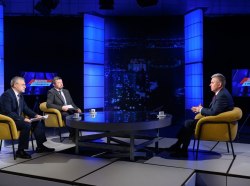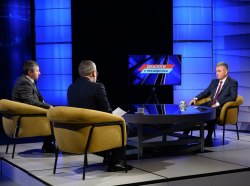The President invited leadership of the PMR Government, the Supreme Council, a number of ministries and departments, as well as major representatives of the agricultural sector of Pridnestrovie to participate in the meeting organized in the format of videoconference. It was about the country's food security. The working discussion concerned three main topics - grain reserves, support for agricultural enterprises that make a significant contribution to ensuring the economic self-sufficiency of the republic, and expansion of the reclamation network as one of the most important factors in the development of the agricultural sector.
The main speaker was the Chairman of the PMR Government Alexander Martynov. He announced the most significant figures for understanding the situation in agriculture. The forecasted losses of crops this year are 53%. The winter crops were lost on 61 thousand hectares, winter crops were damaged on 36 thousand hectares. The unproduced harvest exceeds 260 thousand tons (in monetary $ 44 million). Corn and sunflower was lost on nearly 25 thousand hectares of Pridnestrovian land, even more area of damaged crops of spring crops. Almost 11 thousand hectares of fruit plantations and 2,5 thousand hectares of vineyards have suffered from the so-called return frosts.
As a consequence of this year's poor harvest, there is a decrease in the livestock population: the predicted "minus" is 25% in sheep breeding and farms that breed goats, and 15% in cattle.
The indicators of the provision of the population of the republic with the main types of agricultural products are falling. According to the government's calculations, by the end of 2020, Pridnestrovie will be provided with grain by 137% (for comparison, in 2019 - 500%), vegetables - by 40%, potatoes - 16%. The predicted supply of fruits will decrease by half and amount to 96% of the demand, and sunflower seeds - by seven times (but the demand of the republic's population will be fully covered: before, a significant part of this type of product was exported). Milk production will make 42% of the demand, meat - 32%.
It is still difficult to make forecasts for 2021: much depends on the upcoming sowing campaign, but the Government expects that the indicators will be higher than in the crisis of 2020. Anti-crisis program was launched to support the agricultural sector. It involves exemption from the payment of land tax and flat agricultural tax in respect of areas with lost crops, a decrease from 3.9% to 2% of the income tax rate for organizations in the fruit and vegetable industry, the prolongation of previously issued subsidized loans for development of agriculture, obtaining two-year foreign currency loans with subsidized interest rate for replenishment of working capital. As for the measures taken for development of the agro-industrial complex of a systemic (not anti-crisis) nature, they include possible tax adjustments, dairy subsidies, subsidies for acquisition of heifers of cattle, concessional lending (which made it possible to make a serious investment breakthrough in 2018-2020), and also development of reclamation complex. They talked about it in detail at the meeting.
Today there are 135 pumping stations in the republic. 52 are functioning. 9 of them were returned to service during the last three years. During this time, a significant number of stations were mothballed. Many are subject to restoration out of 83 idle today. 5.5 million rubles have been invested by the State Institution "Pridnestrovian Irrigation Systems" for several years, a million has been allocated by the state, another seven million are planned to be invested in the reclamation complex by the end of this year. In addition, approximately three dozen applications (total amount of 7 million euros) for loans to land users expanding irrigated lands were satisfied. The area has doubled since the beginning of 2017 (from 9 thousand hectares to 18 thousand), the volume of water supply has almost quadrupled (from 12 million to 41 million cubic meters). At the same time, the cost of a cubic meter of water is reduced. If earlier it was 1.76 rubles, then in 2020 it will be a ruble. The decrease is due to the fact that with large volumes of water supply, the costs of maintaining the organization, a significant part of which are employee salaries, remain the same. Moreover, reorganization measures are being carried out that optimize the activities of the enterprise. It is planned to transfer the State Institutions to the State Unitary Enterprise, the transition from estimated (budget) financing to the system of covering the inter-tariff difference by the state, which has proven its effectiveness on the example of enterprises of natural monopolies. The President supports this initiative.
They spoke at the meeting that the initially announced freeze of the irrigation water tariff for three years will be prolonged. This measure of support for land users, when the difference is covered by the state, is productive and justified, Vadim Krasnoselsky considers. Moreover, the President noted that the price of irrigation water can decrease if its cost falls. This can be achieved in one case: by increasing the area of irrigated land. According to the program launched this year, within six years of its operation, the coverage of land reclamation should increase 1.6 times (plus 11 thousand hectares). It is planned to reconstruct at least 15 pumping stations. The program budget is 60 million rubles. As a result, the yield should grow one and a half times. Various sources of funding for this program are being considered. The most optimal option seems to be the introduction of a targeted fee. The insignificant sums for the farmers in general will allow, according to the results of one year, to invest 13 million rubles in the development of the reclamation complex. The President considers this approach to be correct, calling it partnership and mutually beneficial. Vadim Krasnoselsky spoke about the fact that in the future it is necessary to change the approach to the use of land resources by entrepreneurs. The President considers that agrarians who grow grain for export should be obliged to allocate part of the land for fruit and vegetable production or to organize production parallel to land use.
Speaking about ensuring food security, Vadim Krasnoselsky recalled that its guarantee is economic self-sufficiency, spelled out in the PMR Development Strategy. The Republic is moving in this direction. The year 2020, with its trials of frost, drought and pandemic, clearly demonstrated that the republic should rely primarily on itself, Vadim Krasnoselsky emphasized. The level of self-sufficiency to which one should strive is 65-70%, the President aimed, reminding that Pridnestrovie is capable of filling the consumer basket. In the context of import substitution, Vadim Krasnoselsky instructed to study the possibilities of local manufacturers capable of manufacturing equipment for the reclamation system. The "Electromash" Tiraspol plant, for example, produces electric motors of various capacities. As for the pumps, they are still in the range of products of this enterprise only for household use. It was instructed to work out the prospects for creating industrial-level units. There are also manufacturers of plastic pipes suitable for irrigation systems in the republic. The organization of domestic production is an important component of nationwide activities to ensure self-sufficiency, strengthen and develop economic potential, Vadim Krasnoselsky stressed. He called on government bodies and the business community to continue constructive interaction.


